Food Manufacturing News
Major retailers distancing themselves from CP Foods following allegations supply chain is linked to slavery
Thai company Charoen Pokphand Group, a major food conglomerate involved in the produce breeding, processing and grocery sectors, is under fire following allegations that its seafood supply chain is linked to illegal labour practices.
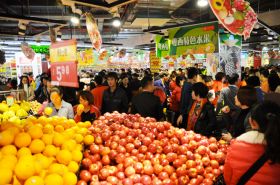
As with the recent horsemeat scandal in Europe, the scandal looks set to cast doubt over the integrity of international food retail supply chains as well as the CSR programmes that suppliers involved in the grocery trade are nowadays so keen to publicise.
A six-month investigation by the Guardian revealed that CP Group’s Thai-based subsidiary CP Foods buys fishmeal to feed its farmed prawns from suppliers linked to Thai fishing boats that are allegedly manned with slaves.
CP Foods released a statement Wednesday saying it denounced slavery and will use its commercial weight to influence the Thai government to act on the matter, rather than walking away from the country’s fishing industry.
CP Foods distributes, both directly and indirectly, to major retailers including Walmart, Carrefour, CostCo, Tesco and Aldi, who have been quick to distance themselves from the allegations, condemning slavery and announcing social audits. Carrefour has condemned the allegations, releasing a statement that said: “As a precautionary measure, Carrefour has decided to immediately suspend its direct or indirect purchases from this company until light has been shed on the situation.”
As the US prepares its 2014 Trafficking in Persons report, the Guardian reported that the US may downgrade Thailand’s ranking to tier three, setting it alongside North Korea and Saudi Arabia for apparently failing to address human trafficking issues. Such a move would potentially lead to restrictions on foreign aid from the US and the World Bank.
CP Foods is a subsidiary of CP Group, an agribusiness conglomerate that operates Siam Makro stores in Thailand as well as Lotus SuperCenters in China.
The group’s Chia Tai unit is involved in the research, development and supply of vegetable and flower seeds.
In 2012, CP Foods opened a Melbourne office, supplying frozen foods to Woolworths, CostCo, 7-Eleven and some IGA stores

Like-for-like 12-week sales at Justin King-led retailer down for second quarter in a row, as Mike Coupe prepares to become CEO
There has been no dramatic turnaround in sales fortunes for outgoing Sainsbury’s CEO Justin King: for the second quarter in a row, the retailer has seen its share of the market fall.
Like-for-like sales in the 3 months to 7 June 2014 were shown to be more than one per cent lower compared with a year earlier, with the results following on from the first decline in sales at Sainsbury’s in eight years reported in March.
The retailer is currently preparing for Mike Coupe, the company’s group commercial director, to take over as chief executive from King, who has been in the post for the last ten years.
King said: “Lower food price inflation and reduced fuel prices are a welcome respite to customers’ finances, but they continue to spend cautiously, leading to industry growth in the quarter being the slowest in a decade.”
Sainsbury’s latest fall in sales comes only a short time after Tesco revealed it also saw a like-for-like sales slump for the second quarter of the year.
Citrus committee is ramping up efforts to open Chinese and Brazilian market
Chilean citrus exports are set to fall in 2014 due to the effects of last September’s freeze and a drought in the IV region, which has cut production across all main varieties.
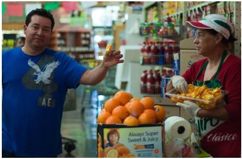
Monserrat Valenzuela of the Chilean Citrus Committee told Fruitnet that the biggest drop is likely to be seen in clementines with shipments forecast to fall by 13% to 27,705 tonnes. Orange exports are expected to be down 9% at 64,130 tonnes, while mandarin shipments are set to rise by 5% to 33,233 tonnes.
Although lemon production is also down, the committee said exports would most likely remain similar to last season as companies seek to take advantage of undersupplied international markets.
The US is the main destination for Chilean citrus, absorbing almost 80% of total export volumes. Asia – principally Japan – accounts for another 10%, while a further 6% is sent to Europe. Valenzuela said one of the committee’s top priorities this season is to gain authorisation to ship to China and Brazil.
Watercress tops list aimed at defining the nutritional density that makes a “powerhouse” fruit and vegetable
Superfoods have been the rage for several years – the things that, if we eat them, are said to protect us from a variety of health issues.
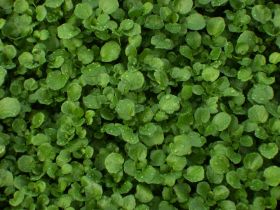
Many a food item has had its 15 minutes as ‘the’ superfood, but a new list looking to define what exactly “powerhouse” fruit and vegetables (PFV) are put watercress at the top of the list.
The research, from the United States of America’s William Paterson University, rated 47 different fruits and vegetables on their compilation of fibre, calcium, protein, potassium, and vitamins, among other things.
Researchers developed and validated a classification scheme defining PFV as foods providing, on average, 10% or more daily value per 100 kcal of 17 qualifying nutrients.
Of the 47 foods studied, 41 satisfied the powerhouse criterion and were more nutrient-dense than were non-PFV, providing preliminary evidence of the validity of the classification scheme.
The researchers’ top 30 is as follows:
1. Watercress // 2. Chinese cabbage // 3. Chard // 4. Beet greens // 5. Spinach // 6. Chicory // 7. Leaf lettuce // 8. Parsley // 9. Romaine lettuce // 10. Collard greens // 11. Turnip greens // 12. Mustard greens // 13. Endives // 14. Chives // 15. Kale // 16. Dandelion greens // 17. Red peppers // 18. Rocket // 19. Broccoli // 20. Pumpkin // 21. Brussels sprouts // 22. Spring onions // 23. Kohlrabi // 24. Cauliflower // 25. Cabbage // 26. Carrots // 27. Tomatoes // 28. Lemons // 29. Iceberg lettuce // 30. Strawberries
The six that didn’t make the cut were raspberries, tangerines, cranberries, garlic, onions, and blueberries.
Firm celebrating third successful season of chilli farming in Senegal, and plans to up production by 50%
Brits’ demand for hotter chillies is resulting in a rise in production for exotics giant Barfoots of Botley.
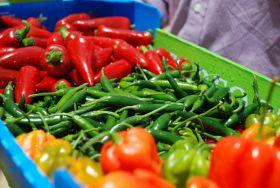
The firm is celebrating a third successful season for its chilli farming operation in Senegal, which, in 2014 alone, has produced over 300 tonnes of chillies including Fresno, Jalapeno, Bird’s Eye, Finger, Scotch Bonnets and Jalokia – the infamous Scoville-Scale busting ‘Ghost Chilli’ otherwise known as the Naga.
The success of the Senegal project will result in a 50% increase in production for the new season starting in December.
New varietal development has also been high on the agenda for European customers, with varietal exclusives such as Poblano, Shakira, Aji, Limo, Rocotto and Serano successfully passing through trials and now becoming available in commercial volumes.
James Meers, commercial manager of Barfoots, said: “Following this year’s success on NPD, we are expanding our production in Senegal with unique varieties from Latin America, which are being demanded by customers with a growing interest in the region’s cuisine, from Pan-Andean to Mexican dishes.
“These cuisines all require authentic ingredients to make recipes come alive. The fresh chilli category is really getting consumers excited.”
Further sales growth is expected from retailers as their focus turns to retail opportunities for the upcoming football World Cup in Brazil.
R&G Fresh Herbs secures contract to supply foodservice giant with 16,000 100g bags of herb varieties on a weekly basis
The UK’s leading supplier of fresh cut herbs to the supermarket, foodservice and wholesale sectors has landed a deal with a major new customer.

R&G Fresh Herbs has agreed a contract for its Nature’s Flavours brand with foodservice supplier Reynolds to fulfil a weekly order of approximately 16,000 100g bags of 16 different fresh cut herb varieties.
The order represents a substantial part of the overall herb requirements of the foodservice business.
Dean Fowler, R&G’s general manager, said: “With a long history of supplying the finest fresh cut herbs in the UK, R&G is extremely well positioned to fulfil such an order.”
Representatives from Reynolds visited R&G’s main Woking site and toured the production and packhouse facilities as part of the due diligence process.
“The Reynolds team were very happy with what they saw, as R&G adheres to the most stringent quality control standards and operates a state of the art processing and production facility,” Fowler added.
The first branded fresh cut herbs to consistently feature micro-perforated packaging – something that allows the herbs to respire and thus prolong shelf life – has enjoyed significant commercial success since its November 2012 launch.
The Nature’s Flavours brand has supplied Whole Foods Market, Harrods and Ocado amount its retail customers, in addition to ingredients box suppliers such as Hello Fresh, a raft of wholesalers, and now Reynolds, as it makes significant inroads in the foodservice sector.
The US Pacific Northwest is on course for a record apple harvest, however, a labour shortage could see apples left unpicked
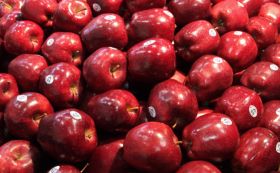
The US Pacific Northwest is shaping up for a record apple harvest, with an estimated 140m boxes over the 2014/15 season, well above the previous record of 128.8m in 2012, reports Capital Press.
“This fall’s crop will be ginormous,” general manager of apple packer-marketer Double Diamond Fruit’s Mike Robinson told Capital Press. “The weather has been absolutely favourable. No frost. Huge bloom. New blocks everywhere. The only thing constraining availability of crop will be availability of people to pick it.”
Dan Fazio, director of the Washington Farm Labor Association, shares Robinson’s concerns and predicts a 10 per cent labour shortage in the region.
“The shortage figure is very concerning given industry projections of a record-setting apple crop and the risk that there will not be sufficient workers to harvest it,” Fazio said in a news release.
Other issues dampening predictions of a record harvest are constrained export markets – China is still closed to US apple shipments and there are fears US sanctions on Russia could result in reciprocal sanctions on US produce.
The Northwest’s top apple export markets are Mexico, Canada and Taiwan, with about one-third of apples exports annually, according to the Northwest Horticultural Council.
Announcement of Sir Ian Gibson’s intention to step down follows a loss-making year for the retailer

Morrisons chairman Sir Ian Gibson has announced that he will stand down at next year’s annual general meeting.
The news came ahead of today (5 June)’s AGM which follows a loss-making year in 2013.
A spokesperson for the retailer said it would conduct “an orderly process” to find a successor and further announcements will follow soon.
Gibson said: “This term will take me into my eighth year on the Morrisons board, and this announcement gives the board time to conduct an orderly search for a new chairman and ensure a smooth transition.”
Gibson, who joined the company as non-executive deputy chairman in September 2007, was appointed chairman following the retirement of Sir Ken Morrison in March 2008.
Last month, Morrisons revealed details of its new £1 billion price cutting campaign, launched after the group recorded a loss of £176 million in the year to February 2, 2014, after a profit of £879 million the year before.
New Zealand fruit export and logistics corporation set to release new and existing shares to investors by mid-July
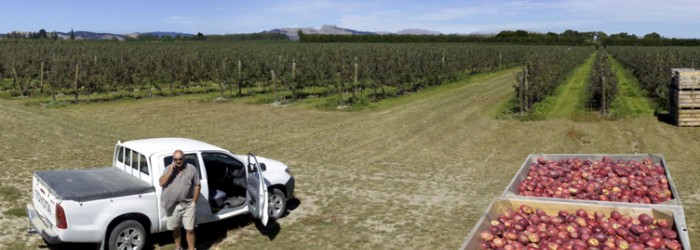
Scales Corp, the fruit and vegetables logistics group which owns New Zealand’s largest apple exporter Mr Apple, has announced it is considering listing on the New Zealand stock exchange.
In a statement, the group said it would publish a prospectus by mid-June and that shares were expected to appear on the exchange’s main board by the middle of July.
New shares will be issued by the company while its majority shareholder, the private equity firm Direct Capital, which owns 84 per cent of Scales through its Direct Capital IV and Pohutukawa II funds, will sell down some of its shareholding alongside co-investors ACC and the New Zealand Superannuation Fund.
Scales recently posted an annual profit of NZ$20.4m for 2013, 50 per cent up on the previous year’s result, buoyed by strong prices for Mr Apple’s apple exports on the back of increased demand in Asia.
The group also owns and operates airfreight service Balance Cargo, ocean freight service provider Scales Logistics, coldstorage operators Polarcold Stores and Whakatu Coldstores and fruit juice concentrate business Pro Fruit.